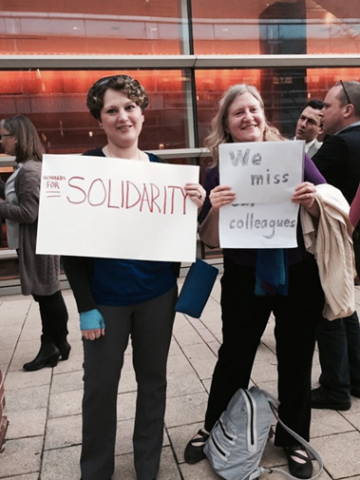The International Studies Association (ISA) Convention is held annually in a different North American city every year, almost always in the United States. This year’s conference was held in Baltimore February 21-25. To my knowledge, ISA is the largest conference for those who study international relations, hosting more than 6,000 scholars and political scientists annually.[1]
This year the Trump travel ban hung heavy in the air. After the ban was announced, it quickly became clear that some attendees would not be able to attend because they were nationals or dual-nationals of countries on the ban list. I’ve heard from people involved with the ISA governing council that about 70 people were affected. Another 100 or so would-be-attendees (mostly from Europe) boycotted the conference out of principle.

After the travel ban was lifted, some of the scholars originally banned were able to attend and others understandably chose not to. It would be fair to say that the travel ban, announced so close to the ISA convention, put the conference organizers in a really difficult position despite the relatively quick reversal of the ban.
After their initial response was criticized for being somewhat tepid, ISA came out with a stronger statement criticizing the ban and its effect on academic freedom. Some of the attendees organized a silent protest on Friday afternoon. Others had stories of being detained at the border for extra questioning, presumably because they had visited or done fieldwork in one of the countries on the list.
I must confess that I also felt uneasy crossing into the United States, despite the fact that I am a naturalized U.S. citizen. I worried that my Turkish background may flag me for extra questioning (this didn’t happen). The new U.S. government needs to realize that this kind of uncertainty exists; people from all around the world will think twice before traveling to the United States for conferences, business, and tourism.
There were calls made to the ISA Governing Council to move future conferences out of the United States. This is unlikely at the moment, particularly because conference venues are booked many years in advance. But if the travel ban is re-imposed, broadened, or if the free-speech climate in the United States takes a turn for the worse, such calls will be given serious consideration. Canadian cities—Montreal and Toronto—will certainly become more attractive to conference goers.
Of course, it is not only the United States that has become unwelcoming for academic conferences. In 2016, two major conferences associated with international relations/political science—EISA and IPSA—were cancelled or moved at great cost to the organizing associations because they were to take place in Turkey and there were serious concerns about security and the repressive academic climate there. (In recent years, PONARS Eurasia had to move conference locations out of similar concerns.)
Given the proliferation of authoritarian environments and the tragic risks academics face for living or doing fieldwork in such environments, the sad conclusion is that academics face a very different world than they did less than a decade ago. The only silver lining I see is that the current environment will push our discipline toward more substantive and timely research questions.
[1] Like most active international relations scholars, I have been attending this conference every year since I was graduate student. The way it works is that one applies to the conference with a paper, panel, or roundtable proposal in June, the selections are announced in the fall, and then the conference is held sometime between February and April. The general idea is to have researchers present their most recent findings and arguments to get constructive feedback from their peers. Panels usually have four or five paper presenters, a chair who introduces the speakers and keeps the time, and a discussant who will have read the papers in advance and who comments both on the theme of the panel and the specific papers. By contrast, roundtables feature five or six experts reflecting on a particular theme. In both formats, presenters speak for 10-15 minutes each and then the floor is opened to questions from the audience.
Photo credit: Aida Hozic
Also see:
Russia and NATO (ISA Dispatch 2/3)
Plus ça change, plus c'est la même chose? Maybe not any more (ISA Dispatch 3/3)











